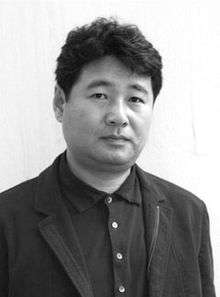Jang Seoknam
| Jang Seoknam | |
|---|---|
 | |
| Born | August 3, 1965 |
| Language | Korean |
| Nationality | South Korean |
| Citizenship | South Korean |
| Jang Seoknam | |
| Hangul | 장석남 |
|---|---|
| Hanja | 張錫南 |
| Revised Romanization | Jang Seok-nam |
| McCune–Reischauer | Chang Sŏk-nam |
Jang Seoknam (Hangul: 장석남) is a South Korean poet.[1]
Life
Jang Seoknam was born on August 3, 1965 in Incheon Metropolitan City, South Korea. Jang earned an undergraduate degree in creative writing from the Seoul Institute of the Arts and a Ph.D. from the Inha University Graduate School of Literature. Since 2003 he has worked in two different positions as an Assistant Professor at Hanyang Women's University.[2] Jang debuted as a poet in his early 20s[3] in a New Year’s Writers Contest sponsored by the magazine Kyunghyang Shinmun.[4]
Work
LIST Magazine characterizes Jang's work as, "(showing) the stature of a leading poet of lyricism with the purity of memory and an acute sense of language,"[5] and The Korea Literature Translation Institute summarizes his work:
- In the epilogue included in his first collection Defecting to a Flock of Birds (Sae ddedeul egero ui mangmyeong), he confesses that he dreams daily of fusing together his life with music. Literature, he suggests, is merely a code, a sign that cannot be understood by a blind man; while music can be understood by everyone. This certainly is a surprising claim for a poet. But Jang says “poetry is a beautiful raft I must take to get to music, to dance, to the blaze.” Most poets emphasize the absolute, transcendent qualities of language, but he does not mystify poetry or its medium, language, rather seeing it as a medium to reach something else that is absolute.[6]
- Thus the poet boldly announces, “I lay down my head where the door to language is shut.” Jabbing at Descartes’ famous maxim “I think, therefore I am,” he says, “I exist completely as a poet only where language is absent.” Jang’s belief that ‘dance’ and ‘music’ are free from ‘language’ and ‘morality’ stems from his own individual ideas about language. Constantly absorbing worldly ideas and moral standards, language is impure and polluted. Yet language can never be abandoned because it serves as the basis for human thought and expression. Though it is impure, the poet tries attaining to expressions of ideal worlds such as ‘dance’ and ‘music.’ [7]
- This worldview of the poet makes his poetry “musical,” not in the sense of rhythms and tones, but in the sense of aspiring to achieve the purity of music. He plays the instrument of silence called the world with language, and makes all things dance. This is the ideal aesthetic world that the poet seeks to create.[8]
Jang's major poetry collections include Defecting to a Flock of Birds (Sae ddedeul egero ui mangmyeong, 1991); Now, doing my best to long for no one (Jigeumeun ganshinhi amudo geureopji anheul muryeop, 1995); Teary Eye (Jeojeun nun, 1998); Pain in my heart (Oen jjok gaseum araeggae e on tongjeung, 2001), and Where do Smiles Go? (Misoneun eodiro gashiryeoneunga, 2006).[9]
For his literary accomplishments Jang has been awarded the Gim Suyeong Prize in 1992, the Hyeondae Munhak Prize in 1999, and the Midang Literature Prize in 2010.[10]
Jang has not had any works in translation published formally, but noted translator of Korean poetry, Brother Anthony of Taizé has translated three of Jang's poems on his hompi (Korean home page). These three poems are: Winter Pond; Hanging Plum-Blossom, and; I Turn off the Light.[11]
Works in Korean (Partial)
Poetry Collections
- Defecting to a Flock of Birds (Sae ddedeul egero ui mangmyeong, 1991
- Now, doing my best to long for no one (Jigeumeun ganshinhi amudo geureopji anheul muryeop, 1995)
- Teary Eye (Jeojeun nun, 1998); Pain in my heart (Oen jjok gaseum araeggae e on tongjeung, 2001)
- Where do Smiles Go? (Misoneun eodiro gashiryeoneunga, 2006).
Awards
- Gim Suyeong Prize in 1992
- Hyeondae Munhak Prize in 1999
- Midang Literature Prize in 2010.
References
- ↑ ”Jang Seok Nam" LTI Korea Datasheet available at LTI Korea Library or online at: http://klti.or.kr/ke_04_03_011.do# Archived 2013-09-21 at the Wayback Machine.
- ↑ "Naver Search". naver.com. Naver. Retrieved 14 December 2013.
- ↑ S|"Jang Seok Nam" LTI Korea Datasheet available at LTI Korea Library or online at: http://klti.or.kr/ke_04_03_011.do# Archived 2013-09-21 at the Wayback Machine.
- ↑ "Naver Search". naver.com. Naver. Retrieved 14 December 2013.
- ↑ Yoo, Sungho (Winter 2010), "Rediscovering the Self Through Lyricism", LIST Magazine, Vol.10: 14
- ↑ Source-attribution|"Jang Seok Nam" LTI Korea Datasheet available at LTI Korea Library or online at: http://klti.or.kr/ke_04_03_011.do# Archived 2013-09-21 at the Wayback Machine.
- ↑ Source-attribution|"Jang Seok Nam" LTI Korea Datasheet available at LTI Korea Library or online at: http://klti.or.kr/ke_04_03_011.do# Archived 2013-09-21 at the Wayback Machine.
- ↑ Source-attribution|"Jang Seok Nam" LTI Korea Datasheet available at LTI Korea Library or online at: http://klti.or.kr/ke_04_03_011.do# Archived 2013-09-21 at the Wayback Machine.
- ↑ "Jang Seok Nam" LTI Korea Datasheet available at LTI Korea Library or online at: http://klti.or.kr/ke_04_03_011.do# Archived 2013-09-21 at the Wayback Machine.
- ↑ "Naver Search". naver.com. Naver. Retrieved 14 December 2013.
- ↑ Anthony, Brother (2006). "Nine poems by 3 Korean poets, all published in 2006". Sogang Hompi. Brother Anthony. Retrieved 14 December 2013.